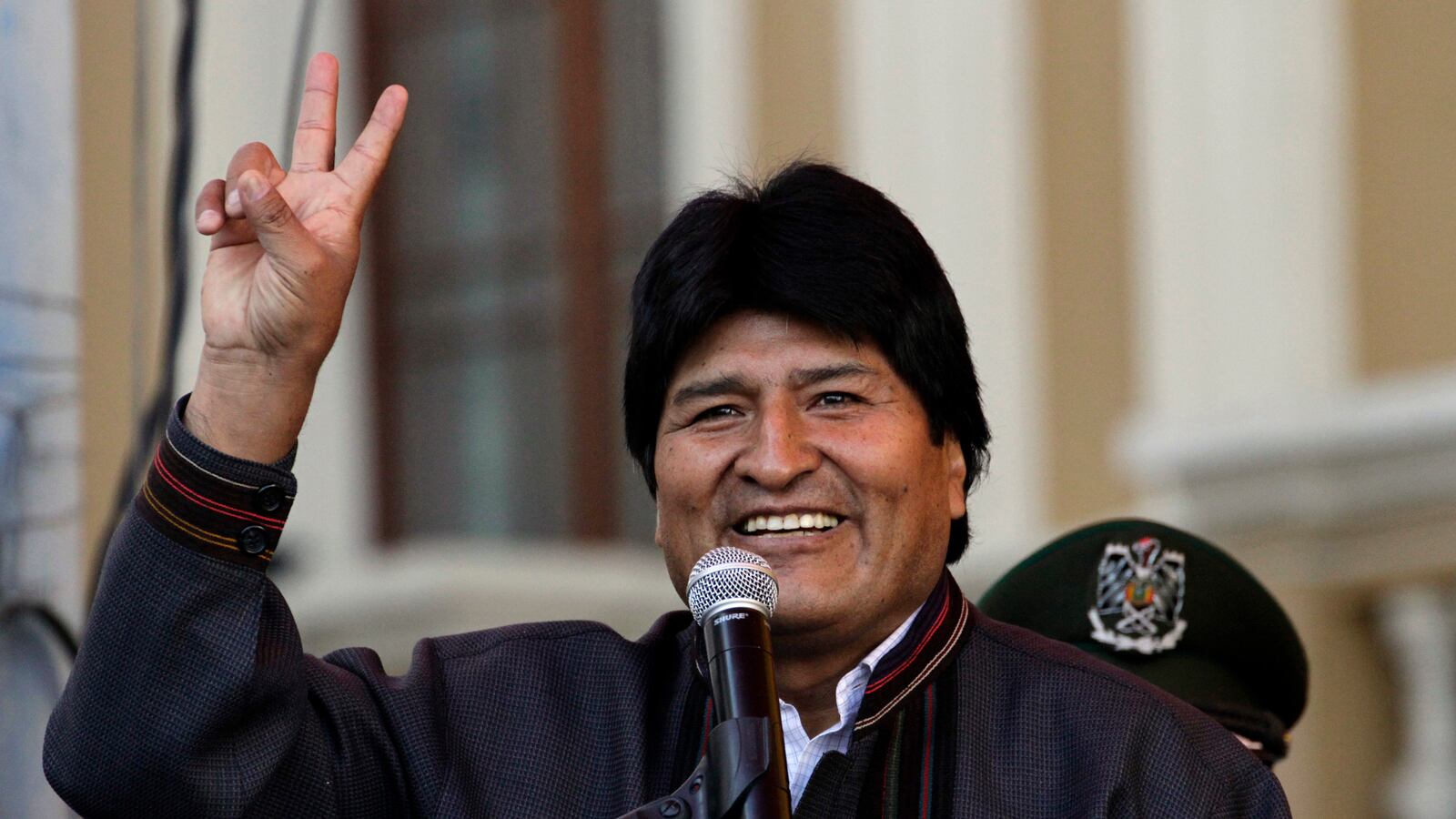What’s better? Living in the transit zone of a Moscow airport or in Bolivia?
That may well be a choice for Edward Snowden, the world’s most famous leaker, if the words of Bolivia’s president, Evo Morales, are to be believed. Morales has been in Moscow this week for an energy conference, and on Tuesday, he told Russia Today that Bolivia was open to the idea of giving Snowden asylum, adding that his country existed to “shield the denounced.”
Late Tuesday, the Associated Press reported that Bolivia’s foreign minister said Morales's plane was re-routed to Austria on suspicion that Snowden was on board. The foreign minister, David Choqehuanca, denied it, saying, "We don't know who invented this lie."

Brazil, Finland, India, and Poland have rejected Snowden’s appeal for asylum. No countries have said yes, though Ecuador’s Rafael Correa is weighing a request filed last week. Even Russia’s Vladimir Putin appears on the fence, saying he would allow Snowden to stay in Russia only if he promised to stop leaking. So what about Bolivia?
A life inside the land-locked Latin American country has its perks to someone trying to evade the U.S. justice system. Morales, a self-described Marxist, has ended most of his country’s cooperation with the U.S. government since assuming power in 2006. He has expelled U.S. diplomats, stopped working with the U.S. Drug Enforcement Administration, and shown little interest in free-trade agreements. In 2009, he urged his citizens not to eat chicken because it caused baldness and homosexuality.
“Bolivia is one of the countries where we have some of the fewest pressure points in Latin America,” says Otto Reich, a former top American diplomat who has worked on Latin America for more than 30 years. “We have not had an ambassador in Bolivia in five years.”
Bolivia has said it didn't receive an asylum request from Snowden. But for Morales himself, Snowden could provide a public-relations boost back home. A former Bolivian ambassador to Washington, Jaime Aparício Otero, said he wasn’t surprised Morales would hint that his government would grant Snowden asylum. “Granting asylum to someone like Snowden would guarantee him a place in the news cycle,” said Aparício. “He could just show up back home [on his presidential plane] with Snowden and make a big splash. Snowden might prefer to go to another country, but if he has no other possibility, who knows?”
A plus for Snowden of settling in La Paz: It would be very difficult for the U.S. to extradite him. The 1995 treaty between the two countries contains an exception for political offenses. This exception is assumed under international law to include “purely political” crimes like espionage. Last month, the Justice Department charged Snowden at first in secret with violating the Espionage Act by disclosing defense information.
Spokespeople for the Bolivian government and for WikiLeaks, the anti-secrecy group that has provided Snowden with travel and legal advice, declined to discuss the potential for a Bolivian asylum for Snowden with the Daily Beast.
Reich, the former American diplomat, says he thinks Morales might just be crazy enough to ferret Snowden to La Paz. “This guy is capable of harboring a Snowden,” he said. “It may also be that cooler heads in his government will prevail and say, ‘Wait a second, we have enough problems with America. Why are we doing this?’” Morales was scheduled to leave Moscow on Wednesday, according to Bolivia’s Ministry of Communication in La Paz.
But before Snowden packs his bags for the Andes, he should consider the pros and cons. For starters, Morales isn’t the most stable Latin American leader and presides over a small and impoverished nation of 11 million, where the wrong political affiliation can be a ticket to trouble or even to jail.
Elected in 2005, Morales was hailed as a people's hero and even as a healer. An Aymara Indian and former grower of coca, the plant from which cocaine is made, Morales rode a wave of anger into the presidential palace in La Paz, becoming the first member of the long-trampled indigenous majority to become head of state. Inaugurated as president in a traditional Aymara ritual at a national archeological site, he set out to empower Amerindian groups, writing a new constitution and renaming the country the Plurinational State of Bolivia. Bolivians of all classes approved, on a wish and a prayer that this authentic man of the people would build bridges across the gaps in this broken society. Instead of a conciliator, they got an avenger.
Bolivia today is more divided than ever. Though Morales remains a hero among the poor and indigenous majority, opinions have wavered with his increasingly erratic government. He saw his ratings plunge after nationwide protests erupted in 2011 over an ill-considered plan to build a highway across a protected park that is home to several native Indian groups. But with the country’s boom in natural gas and minerals like tin and iron, La Paz is awash in money and has spent it on a vast array of social programs that have bought Morales relative peace at home. From a low of 40 percent in 2009, the Morales government’s ratings soared to 60 percent in April, sliding again to 57 percent in May.
But Morales also has launched an aggressive campaign to hound opposition leaders and prosecute members of prior governments for alleged financial crimes and misdeeds. Accused by the Morales government of provoking “economic damage to the state,” conservative Bolivian senator Roger Pinto Molina took refuge in the Brazilian embassy in La Paz in May 2012 and has been there ever since. Former Central Bank president Juan Antonio Morales (no relation to the president) was kept under house arrest for more than a year for alleged “malfeasance.” His supposed offense: garnishing his salary with a bonus of $1,000 a month, which was perfectly legal at the time but outlawed after Morales became president.
Four Bolivian former presidents face criminal action for similar alleged misdeeds, ranging from treason (Eduardo Rodríguez Velzé) to genocide (Gonzalo Sanchez de Lozada). The Morales government tried to extradite Sanchez de Lozada, who currently lives in the Washington, D.C., area, but the U.S. courts demurred.
Yet Morales has managed to harness his popularity to rewrite the national constitution, broadening executive powers. Well into his second term, he convinced the supreme court to allow him to run for a third straight term of office. The opposition cried foul, noting that the new law allows for only one reelection. Morales parried that the new constitution essentially reset the political clock, allowing him a second shot at reelection.
Morales appears to be unfazed by criticism, much less international diplomatic pressures. In 2008, he expelled the U.S. Drug Enforcement Agency from Bolivia, a major source of cocaine for the global market, on grounds that Washington was using its anti-drug efforts to meddle in Bolivian affairs. In May, he upped the ante by throwing out U.S. Agency for International Development, the arm of the U.S. government that is supposed to help rescue nations from poverty.
"There is a cost to such a cavalier attitude," said Aparício, the former Bolivian ambassador to Washington. "But Morales doesn't seem to care."






